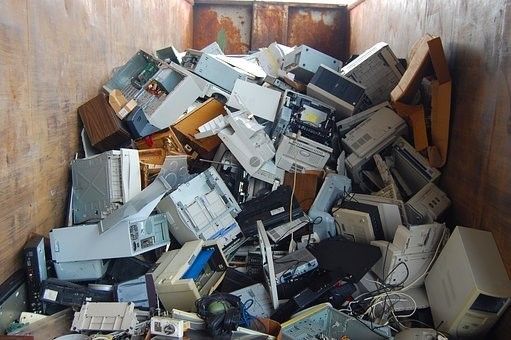When we think about recycling, we often think of paper, aluminum, and plastic. However, we should also consider electronics as part of our recycling mentality. As the newest versions of smartphones, televisions, and computers are released each year, the amount of electronic waste is increasing at a rapid rate. With this increasing waste stream comes the opportunity for recycling and reuse.
Not only does electronic waste include smartphones, TVs, and computers, it also encompasses many other devices, such as:
- printers
- fax machines
- cameras
- VCRs/DVD players
- video game consoles
- speaker systems
In this blog, we will go over the benefits and how-to’s of electronic recycling along with the negative consequences of improper electronic disposal.
Disposal
Underneath the plastic and aluminum casings on electronics are a variety of toxic elements such as lead, mercury, cadmium, and barium. When electronics that reach the end of their life are not properly disposed of, the toxic elements found in electronics have the potential to harm the environment. If you have an electronic item with broken glass or damage, it should be placed in a box or bag and sealed.
Although it is permissible to dispose of electronics in the landfill, televisions and computers are often too large to place in a curbside waste bin. It is best to check with your local waste management facility or landfill to determine if they can accept the device prior to disposing of it. If it is still in working condition, consider reselling or donating the device. If it does not work properly, check to see if there are any electronics recyclers in your local area, or manufacturers that will take back the device.
Benefits of Electronics Recycling
Besides the harmful chemicals found in electronics, many electronic devices contain valuable rare earth minerals such as gold, silver, palladium, and copper. By recycling electronics, precious metals can be stripped from old devices and used in new ones. In fact, companies like Apple are planning to use recycled rare earth elements in their new iPhones, which uses considerably less energy than mining new deposits from the earth.
Additionally, recycling electronics has a positive impact on our economy. According to the 2017 Study on the Economic Impacts of Recycling report, the Texas electronics recycling industry directly contributes over $125 million to the Texas economy.
How to Recycle Your Electronics
A key difference in recycling electronics compared to other household recyclables is that you should not simply place your electronics in a curbside recycling bin. Rather, use one of these options to help you recycle your electronics:
1.Retailer Take-Back: When purchasing new electronics from a retailer, check to see if the retailer has a recycling or take-back program in place for old electronic devices. For example, Best Buy will accept computers and tablets free of charge, or televisions for a fee based on type and size.
2.Manufacturer Take-Back: In Texas, certain electronics equipment manufacturers may offer recycling options to consumers for computers or televisions. To verify if an electronics manufacturer provides a recycling option for your computer or television, visit TexasRecyclesTVs.org or TexasRecyclesComputers.org.
3. Donate: While recycling your device is a great option, it is not always feasible. If your electronic device is in good working condition, consider donating it to your local thrift store to keep it out of the waste stream. You can also visit the EPA website for more information about where you can donate or recycle your electronics.
4. Contact the Texas Commission on Environmental Quality: Although TCEQ cannot recycle electronic devices for you, they can help you find potential electronics recycling locations in your area. For more information, contact TCEQ’s toll-free Electronic Recycling helpline at (855) 887-3292.
Keep in mind that although most recyclers take steps to destroy the information on hard drives or smartphones, it’s important to delete any private information prior to recycling, donating, or reselling your electronic devices.
Blog post written by Alex Frame, Pollution Prevention and Recycling Specialist, External Relations Division, Texas Commission on Environmental Quality.




